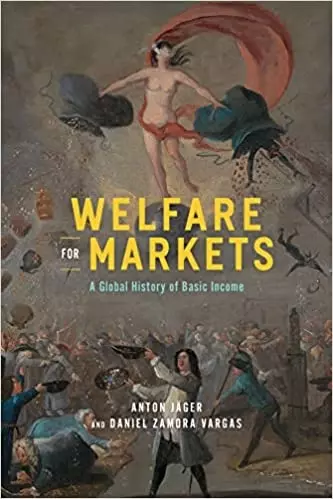Welfare for Markets:
Anton Jäger & Daniel Zamora Vargas
"Welfare for Markets: A Global History of Basic Income (The Life of Ideas)", Anton Jäger & Daniel Zamora Vargas
The authors begin with a well-trodden account of the historic mention of basic income ideas, followed by the development of Milton Friedman’s negative income tax. They then rehearse the shift to cash transfers in the 1960s US welfare policy. The interesting distinction is between i) a strict Keynesian policy of government investment to stimulate the economy and address poverty via the multiplier of wages earned within those investments, and ii) direct cash to consumer income, which is neo-Keynesian in directly stimulating demand. This is all well covered in Sloman et al ‘UBI in Historical Perspective’ to which both authors contributed.
The section on James Boggs on technology freeing workers from labour (p72) is interesting as the ‘income through jobs link became outdated (p71) leading over 1,000 US economists to back a guaranteed income in 1968 (p86). This all led into the Dutch anti-work campaign which fed the proposal for basic income from André Gorz leading to Philippe van Parijs who with others established the BIEN movement. Guy Standing’s work in South Africa, Namibia and India is well covered, but UBI pilots are better examined in part IV of Torry (ed) The Palgrave International Handbook of Basic Income. A long section compares economic development via industrialisation eg in India, with preferable cash transfer schemes yielding primacy to markets rather than the government. The book concludes with a survey of US cash transfer pilots. The narrative is frequently couched in intellectual abstraction.
The coverage is intense but selective. No mention is made of important contributions from writers like Torry, Lansley, Crocker et al covering micro and macro-economic modelling of basic income schemes, or of the Finnish pilot. The basic income proposal is not set in the context of opposing or alternative views, including the claimed cost-efficiency of targeted conditional welfare, universal basic services, job guarantees, or the affordability challenge which is only mentioned but not addressed (p88). This context is a key part of the history of basic income and will determine its future.
The book is available here.
Geoff Crocker
Editor ‘The Case for Universal Basic Income'
www.ubi.org

